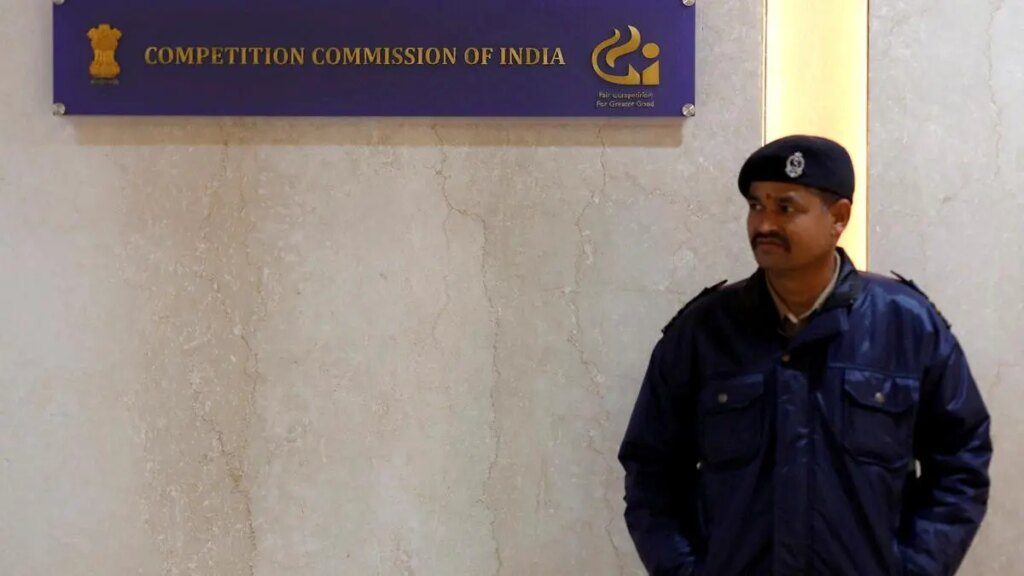
CCI Digital Cinema Penalties: UFO Moviez and Qube Fined for Anti-Competitive Practices
CCI Digital Cinema Penalties: UFO Moviez and Qube Fined for Anti-Competitive Practices
The Competition Commission of India has imposed significant CCI digital cinema penalties on major players in the digital cinema market. Image: CCI
Table of Contents
- CCI Digital Cinema Penalties: Overview of the Ruling
- Companies Involved in the Anti-Competitive Practices
- Key Violations and Anti-Competitive Practices
- Financial Penalties Imposed by CCI
- DCI Technology and Market Dominance
- Non-Monetary Directives and Lease Agreement Changes
- Impact on Digital Cinema Industry in India
CCI Digital Cinema Penalties: Overview of the Ruling
The Competition Commission of India (CCI) has announced significant CCI digital cinema penalties against three major players in the digital cinema hardware and software market. In a landmark decision on Wednesday, the regulator imposed both monetary and non-monetary sanctions on UFO Moviez India Pvt. Ltd (UFO Moviez), its subsidiary Scrabble Digital Ltd. (SDL), and Qube Cinema Technologies Pvt. Ltd. (Qube) for engaging in anti-competitive practices that created barriers for other market participants.
The CCI digital cinema penalties were imposed after the Commission found that these companies had contravened provisions of Section 3(4) of the Competition Act, 2002. These violations included tie-in arrangements and exclusive supply agreements that effectively restricted other players from entering or competing fairly in the market. The ruling represents a significant regulatory intervention in the digital cinema ecosystem in India.
Key Points of the CCI Digital Cinema Penalties Ruling
- Monetary penalties totaling over ₹269 lakh imposed on three companies
- Violations of Section 3(4) of the Competition Act, 2002 identified
- Anti-competitive practices including tie-in arrangements and exclusive supply agreements
- Companies ordered to modify existing lease agreements with cinema theaters
- Restrictions on future contracts that limit content supply from other providers
Companies Involved in the Anti-Competitive Practices
The CCI digital cinema penalties targeted three key players that dominate the digital cinema hardware and software market in India. Understanding their roles in the industry provides context for the Commission’s decision:
| Company | Role in Digital Cinema Market | Penalty Amount |
|---|---|---|
| UFO Moviez India Pvt. Ltd | Major supplier of DCI-Compliant Digital Cinema Equipment (DCE) to theaters in India | ₹104.03 lakh |
| Scrabble Digital Ltd. (SDL) | Subsidiary of UFO Moviez providing post-production processing services | Included in UFO Moviez penalty |
| Qube Cinema Technologies Pvt. Ltd | Significant player in digital cinema technology and equipment supply | ₹165.8 lakh |
According to the CCI’s investigation, UFO Moviez and Qube were identified as significant players in the supply of DCI-Compliant Digital Cinema Equipment (DCE) on lease or rent to Cinema Theatre Owners (CTOs) across India. Their dominant position in this market segment gave them considerable influence over theater operations and content distribution channels, which the Commission found they had leveraged in ways that restricted competition.
The CCI digital cinema penalties reflect the Commission’s assessment of “nature and gravity of the contravention along with assessment of mitigating and aggravating factors” for each company involved in the anti-competitive practices.
Key Violations and Anti-Competitive Practices
The CCI digital cinema penalties were imposed after identifying specific anti-competitive practices that violated Section 3(4) of the Competition Act, 2002. The Commission’s investigation revealed several key violations:
- Restrictive Lease Agreements: UFO Moviez and Qube imposed restrictions on the supply of content in lease agreements with Cinema Theatre Owners (CTOs), creating barriers for other players in the market.
- Barriers to Post-Production Processing: The restrictive practices created obstacles for companies engaged in providing Post-Production Processing (PPP) services, limiting competition in this segment.
- Market Foreclosure: By implementing these restrictive agreements, the companies effectively blocked a significant portion of CTOs with DCI-Compliant DCEs from being served by any other player.
- Tie-in Arrangements: The investigation found evidence of tie-in arrangements where theater owners were compelled to accept certain conditions to access essential services.
- Exclusive Supply Agreements: The companies implemented exclusive supply agreements that prevented theater owners from sourcing content or services from competing providers.
Section 3(4) of the Competition Act
The CCI digital cinema penalties were imposed under Section 3(4) of the Competition Act, 2002, which prohibits agreements between enterprises operating at different levels of the production chain that cause or are likely to cause an appreciable adverse effect on competition in India. This includes tie-in arrangements, exclusive supply agreements, exclusive distribution agreements, refusal to deal, and resale price maintenance.
The Commission concluded that these practices had a significant negative impact on competition in the digital cinema market, justifying the substantial CCI digital cinema penalties imposed on the three companies.
Financial Penalties Imposed by CCI
After thorough investigation and consideration of the violations, the CCI imposed significant financial penalties as part of the CCI digital cinema penalties ruling. The monetary sanctions reflect the Commission’s assessment of the nature and gravity of the contraventions, along with consideration of mitigating and aggravating factors for each company.
The financial components of the CCI digital cinema penalties include:
- A penalty of ₹104.03 lakh against UFO Moviez India Pvt. Ltd. and its subsidiary Scrabble Digital Ltd.
- A penalty of ₹165.8 lakh against Qube Cinema Technologies Pvt. Ltd.
- The total financial penalties amount to ₹269.83 lakh (approximately ₹2.7 crore)
The difference in penalty amounts between the companies may reflect various factors considered by the Commission, including market share, the scale of anti-competitive activities, cooperation during the investigation process, and the economic impact of the violations on the broader market.
These CCI digital cinema penalties serve not only as punishment for past violations but also as a deterrent against similar anti-competitive practices in the future, both for these companies and for other players in the digital cinema market.
DCI Technology and Market Dominance
Central to the CCI digital cinema penalties case is the market for Digital Cinema Initiatives Compliant Digital Cinema Equipment (DCI-Compliant DCE), which plays a crucial role in the modern film exhibition industry. The Commission’s order highlighted the significance of this technology and how market dominance in this segment enabled anti-competitive practices.
DCI-Compliant DCE refers to hardware and software that ensure a consistent and high-quality digital cinema experience. This includes projectors, servers, and other related devices capable of playing back Digital Cinema Packages (DCPs). These technologies represent the industry standard for digital film projection in professional cinema theaters worldwide.
The Commission found that UFO Moviez and Qube had established themselves as significant providers of DCI-Compliant DCE on lease or rent to Cinema Theatre Owners in India. This position gave them considerable leverage in the market, which the CCI determined they had exploited through restrictive agreements and practices that warranted the CCI digital cinema penalties.
Understanding Digital Cinema Standards
DCI (Digital Cinema Initiatives) is a joint venture of major movie studios established to create a standard architecture for digital cinema systems. DCI-Compliant equipment ensures that films are displayed according to these standards, maintaining consistent quality across different theaters. Control of this technology became a key factor in the anti-competitive practices addressed by the CCI digital cinema penalties.
Non-Monetary Directives and Lease Agreement Changes
Beyond the financial CCI digital cinema penalties, the Commission issued important non-monetary directives aimed at addressing the root causes of the anti-competitive behavior. These directives focus on modifying existing business practices and preventing similar restrictions in the future:
- Ban on Restrictive Future Agreements: The Commission directed UFO Moviez and Qube to refrain from entering into new lease agreements with Cinema Theatre Owners that impose restrictions on the supply of content from other parties.
- Modification of Existing Agreements: Existing lease agreements with CTOs must be modified to remove any restrictions on the supply of content from parties other than UFO Moviez (and its affiliates) and Qube.
- Market Opening: The directives aim to open the market to greater competition by removing barriers that previously prevented other players from serving cinema theaters equipped with DCI-Compliant DCE.
These non-monetary aspects of the CCI digital cinema penalties are particularly significant as they address the structural issues in the market that enabled anti-competitive behavior. By mandating changes to business agreements and practices, the Commission seeks to create a more level playing field in the digital cinema industry.
“The Commission directed UFO Moviez and Qube to not re-enter lease agreements with the CTOs imposing restrictions on supply of content from other parties… existing lease agreements with CTOs shall stand modified such that they do not impose restrictions on supply of content from parties other than UFO Moviez (and its affiliates) and Qube.”
— Competition Commission of India Statement
Impact on Digital Cinema Industry in India
The CCI digital cinema penalties and associated directives are expected to have far-reaching implications for the digital cinema landscape in India. By addressing anti-competitive practices in this sector, the Commission’s actions may lead to several significant changes:
- Increased Competition: By removing barriers created by restrictive agreements, the ruling may open doors for new players to enter the market for providing digital cinema equipment and post-production services.
- More Options for Theater Owners: Cinema Theatre Owners will have greater freedom to choose content suppliers and post-production service providers without the constraints previously imposed by dominant players.
- Potential Price Benefits: Increased competition may lead to more competitive pricing for digital cinema equipment leasing and post-production services, potentially benefiting the entire exhibition sector.
- Innovation Stimulus: A more competitive environment could encourage greater innovation in digital cinema technologies and services as companies strive to differentiate themselves in the market.
- Precedent Setting: The CCI digital cinema penalties establish a precedent for regulatory intervention in the entertainment technology sector, potentially influencing business practices in related industries.
The Commission’s action against these major players sends a clear message about the importance of maintaining fair competition in specialized technology markets that form critical infrastructure for creative industries. The implementation of the remedial measures ordered alongside the CCI digital cinema penalties will be crucial in determining how effectively competition is restored to this important segment of India’s entertainment ecosystem.
A More Competitive Future
The CCI digital cinema penalties case highlights the regulator’s growing focus on technology-driven markets where a few players can establish dominant positions through control of specialized equipment and standards. This intervention signals the Commission’s commitment to ensuring that technological advantages are not leveraged to create anti-competitive market structures in India’s rapidly evolving digital economy.






